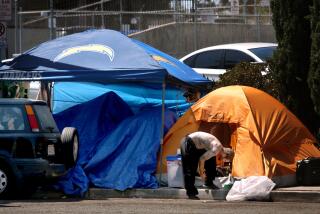County Won’t Extend Permit of Nudist Camp
The Elysium Institute nudist camp, a hub for Southern California’s freedom-of-expression movement in the early 1970s, was dealt a major setback Tuesday in its 16-year battle for survival when the Los Angeles County Board of Supervisors refused to extend its operating permit.
The board’s vote, effective immediately, is a direct turnaround from a decision last May by the county Regional Planning Commission to grant the camp a five-year extension on its operating permit.
According to county officials, the board now can take legal action to shut down the secluded camp in the unincorporated community of Topanga if the private owners do not do so voluntarily.
Ed Lange, founder and executive director of Elysium Institute, vowed to contest the board’s action in court.
“I’m shocked. In fact, I’m angry,” Lange said. “I certainly intend to contest the constitutionality of this move. We believe the Constitution protects an already established institute such as ours.”
The camp gained almost instant notoriety in 1968 when it was raided by a county vice squad soon after it opened. Twenty-three nudists were arrested. As controversy over the camp increased, critics complained to police and county agencies about peeping Toms, hippies, nude hikers and lost nudists ringing nearby doorbells.
Although the camp’s permit was extended last year by the Regional Planning Commission, Lange appealed that decision to the Board of Supervisors, arguing that some of the 27 conditions the commission put on the permit were “odious.”
The commission’s approval carried with it a ban on parking along nearby Topanga Canyon Boulevard and required the institute to reduce its membership of 1,400 by about half until a small road leading to the camp was widened, county officials said.
Lange said that after a hearing before the board Dec. 20, he had expected a “favorable” vote.
But Supervisor Mike Antonovich, who called for denial of the permit, said he pushed for closure of the camp because “it simply does not fit in with the community.”
“People live around there, and they have a right to have the land used in the way that is compatible with their neighborhood,” he said.
More to Read
Sign up for Essential California
The most important California stories and recommendations in your inbox every morning.
You may occasionally receive promotional content from the Los Angeles Times.










